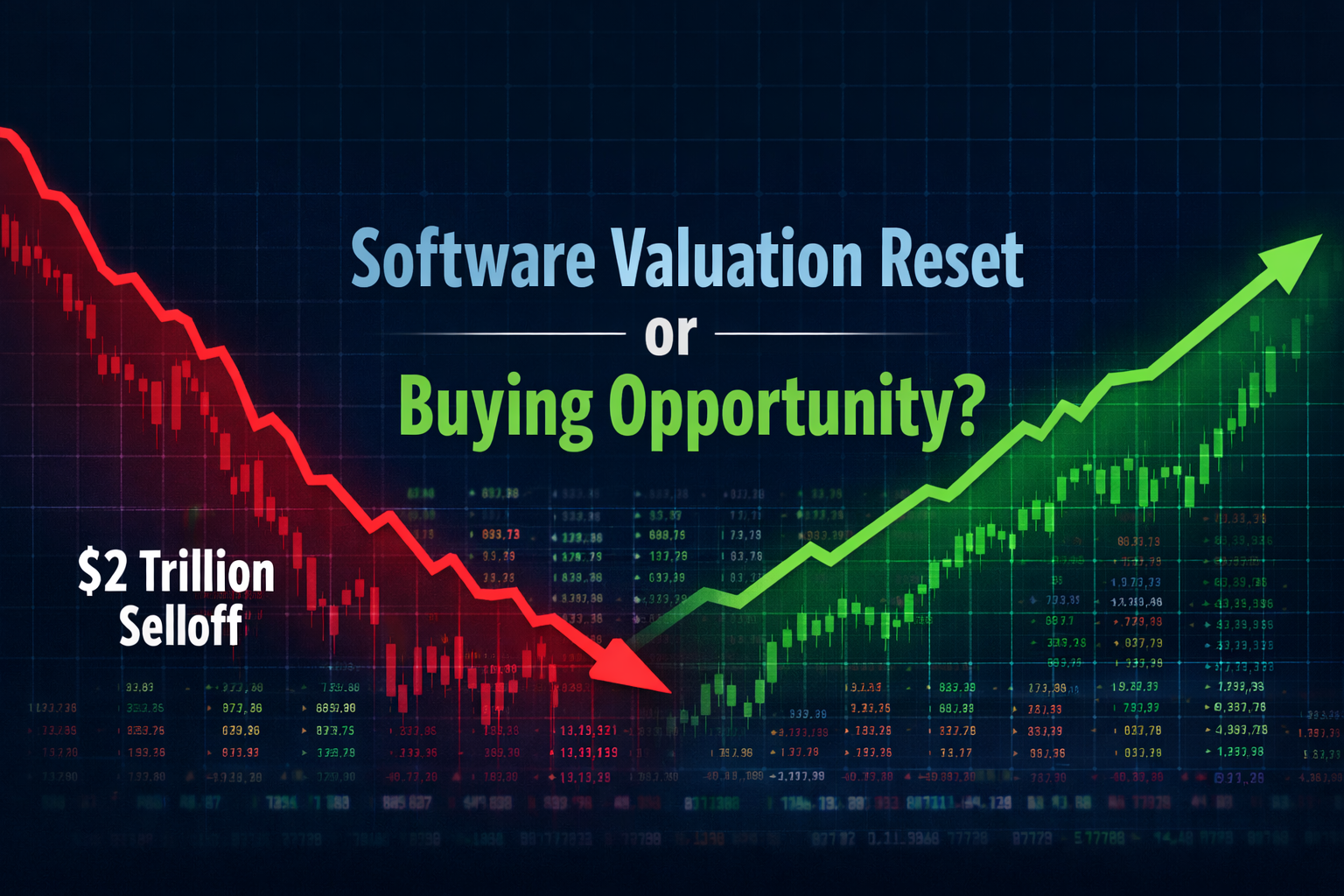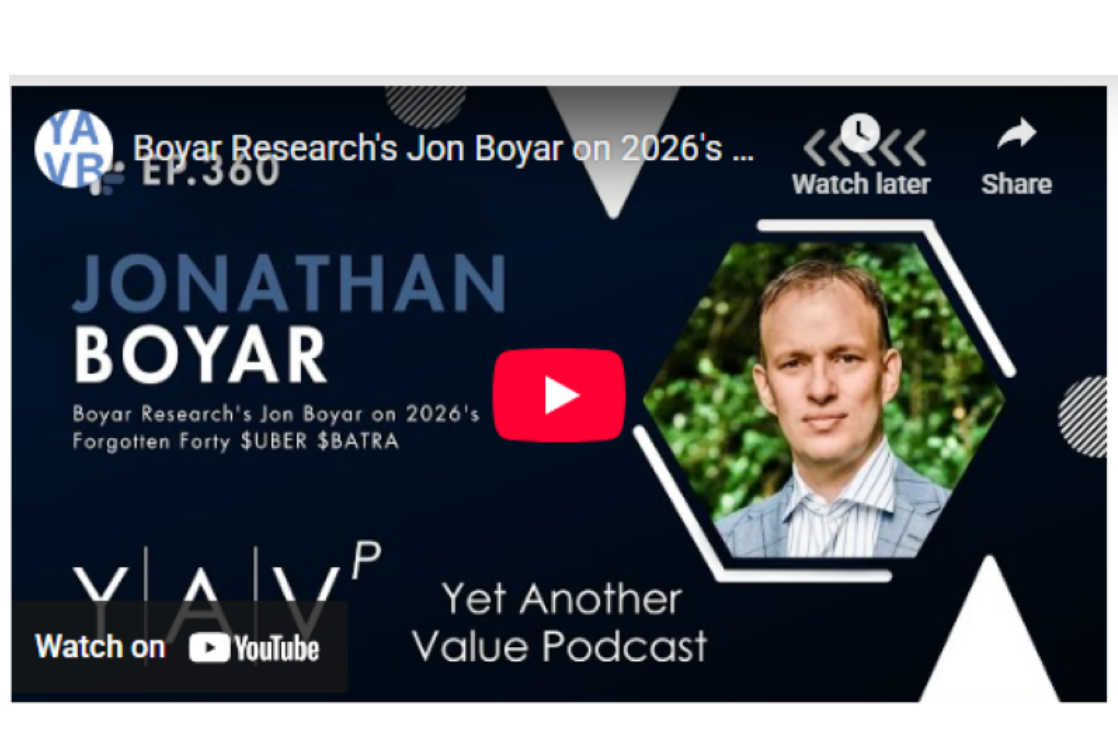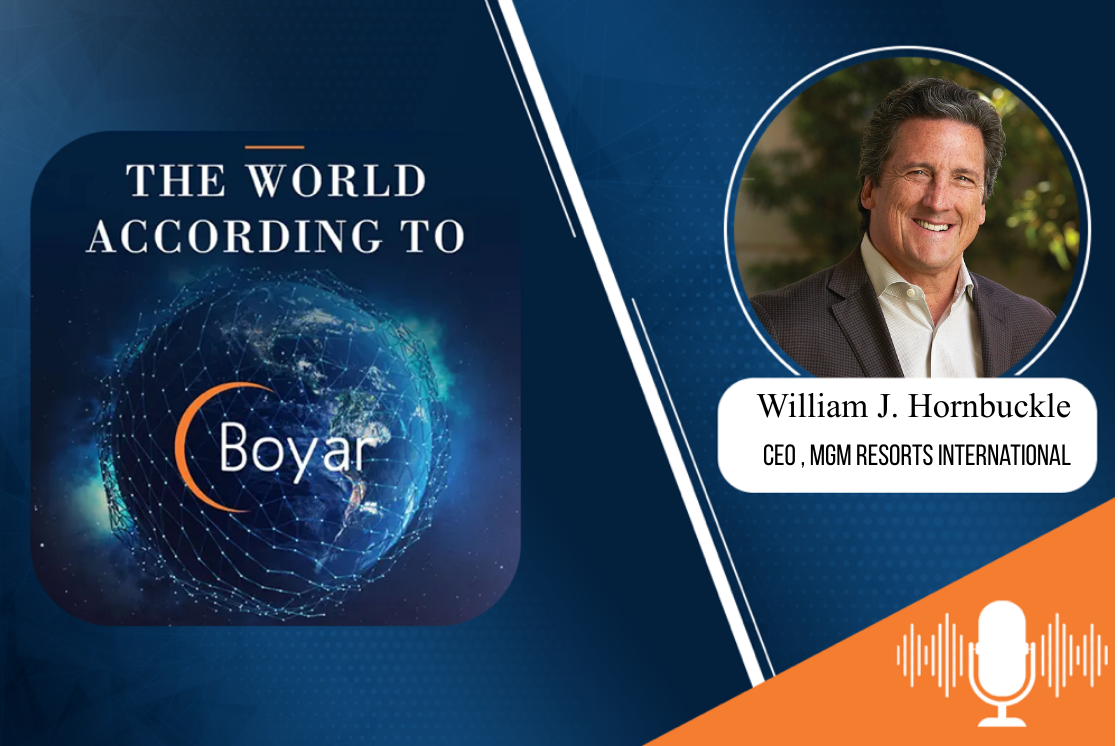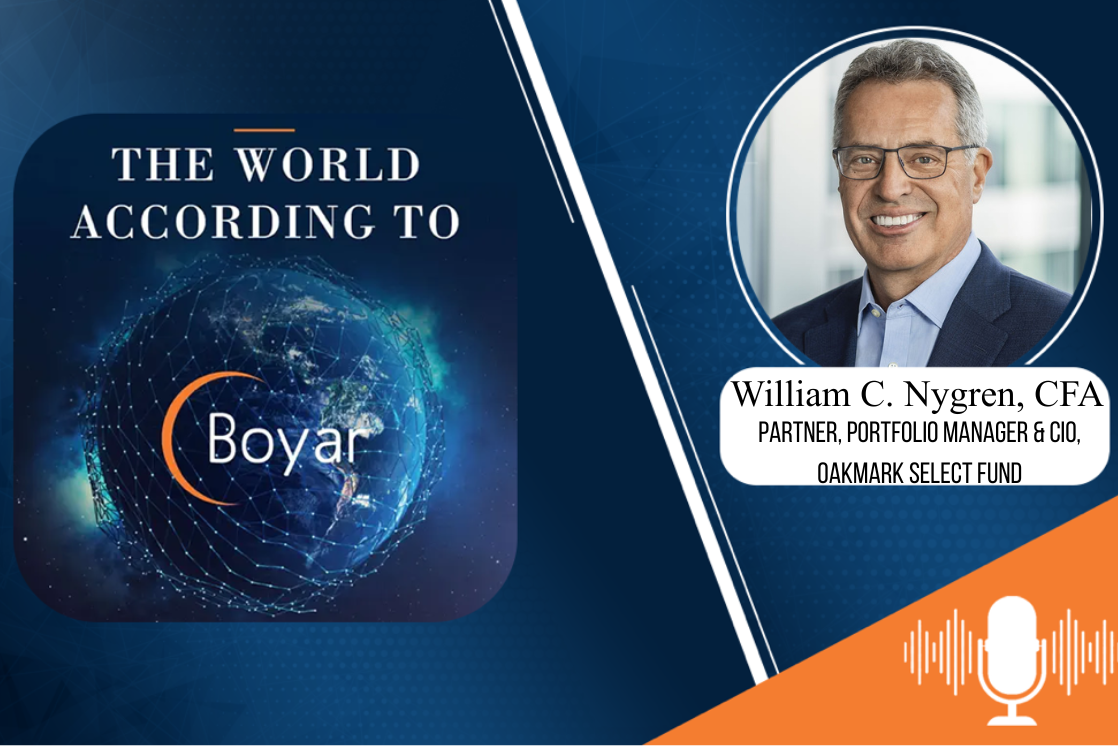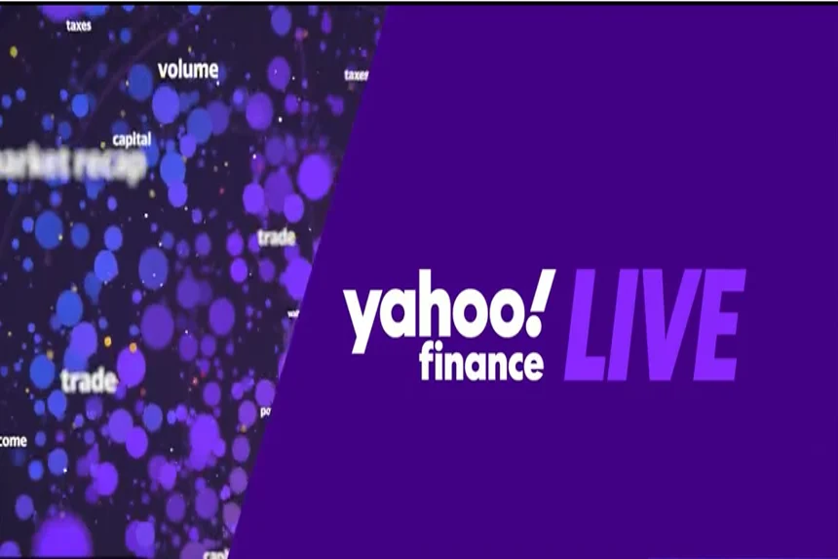What It Takes To Be A Value Investor Today?
Jonathan Boyar joined Brian Sozzi on Yahoo Finance’s Opening Bid podcast where he reflects on what it means to be a value investor in 2024 and discusses the investment case for Uber and Madison Square Garden Sports.
Transcript of the Interview Below:
Welcome to the Opening Bid.
B.S. I'm Brian Sozzi, Yahoo Finance's executive Editor. Thank you for joining us either on YouTube at Yahoo Finance, Spotify, iHeart Media, Pandora or Amazon Music. If you're loving Opening bid, hit us with those likes and fire off your questions and hot takes to me on X at Brian Sozzi and at Yahoo Finance, we're here to help and listen. Now let's make some money and well, hopefully get a lot smarter.
Joining me today is Jonathan Boyar, president of Boyar Research and host of The World According to Boyar podcast.
Jonathan, good to see you in person. Appreciate it.
J.B. Thanks for having me. This is a lot of fun.
J.B. Yeah, it's kind of, it is fun. The ability to explore in the morning and then talk about stocks. It's, you know, I'm really grateful for this platform.
So, you, my friend are known as the value guy. What does it mean to be a value investor in the year 2024?
J.B. That's a great question because it's very different than being a value investor when my dad started the firm in 1975 where you're finding these cigar butts really cheap stocks.
That's not the case. Today you have to be a lot more curious you, you have to be curious. You have to be catalyst driven and you can't just be focused on if something is unbelievably cheap, there has to be something that's gonna make the stock ascend in value.
And we look at anything from nontraditional value stocks like an Uber to an asset play like Madison Square Garden Sports and Uber.
B.S. So an Uber is a value stock in your eyes? So that's what I want to add. Like how do you know you're starting the financials that this stock is a value? How do you identify that?
J.B. Well, you, you look at what it could become and you have to place a value on the network that it's built and you know, it's, this is a very different company than when Travis was running it in 2017.
B.S. Founder Travis Kalanick, right, a very different company indeed. This is actually a real company with like real management and actually makes money and make money.
Always a good thing.
J.B. Yeah, it's always a good thing. And we thought that the, the network they, they built, it would be impossible to replicate are extremely expensive.
So, when it was trading around $30 or $40 a share, it got really interesting to us and it's pulled back recently.
It's, I think it's close to around $65 - $66, down from $80 and we think this thing could be a multi bagger over a long period of time. I mean, there's just a lot of runway for growth. They're doing all the right things. The CEO is doing a fantastic job and it's, it's a verb basically. I mean, you, you use it for everything.
B.S. Yeah, it's true. So, you know, I think I'll call my brother on, on this one. So he will message me and say, hey, I found this cheap stock. It's trading at $3 a share.
And my instinct always to tell him, yeah, it's probably garbage. I mean, can you just help us understand some of the mistakes, investors continue to make one that because the stock is priced under $5 its value. But then two, you know, they may go and see a price to earnings ratio in a company that's, that's three.
And my contention is always, well, it's probably well deserved. It's a crappy company.
J.B. Yeah, you can't just find a stock that's trading at three times earnings.
That's as you said, it's well, it's probably well deserved. You can buy a bunch of low quality retailers.
It's ok, and this is what Buffett learned from Munger is, it's ok to pay up or pay fair value for a stock that is fantastic. Or you wanna buy a great business that has room to compound over decades and that's what you wanna do. You don't wanna just find cheap stocks.
B.S. How do you find your opportunity? So there's, there's just thousands of stocks and it is overwhelming, especially for the average investor doesn't have access to a lot of information, thousands of stocks data coming at them from every angle. How do you go about, about finding, let's say 10 amazing companies to invest in?
And then once you find those amazing companies, what do you look for?
Is it a PE how do you create a management team? Is it cash flow? Like take us through that?
J.B. Yeah, one, it's having a great team. We have a great team of four investment professionals, plus myself and my father. So, but this is all we're doing is looking for it. And the way we look at everything is what would an acquirer pay for the business?
What would Warren Buffett? Well, maybe not Warren Buffett because he doesn't want to pay up.
B.S. He doesn't wanna buy anything right now except chub, chub, chub.
J.B. That's, and we think that's a great idea and maybe he buys the whole thing.
You never know.
Um It's a, it's a cheap stock run by Evan Greenberg and is doing a fantastic job.
But you, you, you wanna look, is this stock selling significantly below what an acquirer would pay for the entire business? And is there a reason for the stock to ascend in value over a reasonable period of time?
Could there be a management change? Could there be a big stock buyback? Could they make a great acquisition?
There's lots of different reasons for a stock to go up?
B.S. What is it like working for your dad?
J.B. It's great. It's, listen, these things can go either way, it can be terrible or it could be fantastic. We have a great relationship. It's a lot of fun. I've learned a ton from him and it's just, you know, I'm lucky. It's just been a fantastic ride and we're just having a lot of fun.
B.S. How did you, how did he get into investing? How did he start?
J.B. His, his dad was an account or my grandfather who I, who I never met was an accountant and decided, you know, and that was a great way of looking at stocks, especially in the 19's , seventies or late sixties when he started his career. And, um, he decided to start a research boutique in 1975. And, you know, he's built a good reputation and then started managing money in 1983.
And, you know, we're, now we're here .
B.S. And you are a lawyer, right?
J.B. I was a lawyer that, wow, that was a mistake.
B.S. It has to help you understand. You know, if companies are doing shenanigan type things, I mean, spotting BS by management teams.
J.B. It, it does law school, law school is great. The practice of being a lawyer and looking at your watch and like, how am I gonna build this? Is this not a great way to make a living.
And I just, you know, I had this opportunity to work with my dad. It was 2008. So I had a great, great timing, you know. You start right in the middle of the great financial crisis, but it's made me a very skeptical investor.
I could see things can go south very, very quickly and you always wanna look at your downside and that's just a great way to um you know, I think to, to invest, it's not what you not what you make, it's what you keep. And you know, preservation of capital is key.
B.S. I think barons uh called you da what the world's most patient investor. How does he stay so patient?
J.B. That's a really good question. I'm patient. Not nearly as patient as he is.
B.S. What is patient even equal? I mean, does he, could he say, buy a stock and maybe hold it for a decade? Is that, is that patient?
J.B. It's patient, you know, it's funny. I had Ken Langone on my, on my podcast.
B.S. Home Depo co founder, right?
J.B. Yeah.
J.B. Fantastic. And you know, he said his average holding period is 38 years. So, and he's done pretty, he's done pretty well.
I mean, I think just being able to hold on through thick and thin, not worrying about the day to day move into the stock market. You know, I, I know from a news perspective, obviously it's exciting.
B.S. We're trying to stay in business, John.
I know we gotta keep the lights on this.
J.B. Exactly. But, but most investors fall into the trap that they have to do something and to what my dad has instilled in me is doing nothing as an action.
Actually, you know, just sticking, I look at what our biggest winners have been, either Home Depot or Ameriprise or Microsoft. Just sticking with them through thick and thin and letting the magic of tax deferred, compounding work is a great way to make money.
B.S. In an interesting way, let's actually segues nicely into the next topic.And I, I thought I'm like, I have to ask a value guy about the return of the meme stock mania.
I'll just put it over to you. What do you think about the action we're seeing again in a company like a Gamestop and AMC. Both of them, I would argue are distressed companies.
J.B. Uh Your argument is 100% correct. I think it's horrible for investors. Spencer Jacob over at the Wall Street Journal wrote a great book a couple of years ago on this and the people who are gonna be holding the bag are individual investors.
Some of the fast money, hedge funds that are probably making money off of this or will do just fine. But it's, this is a recipe to lose money. There's no instant way to make money.
It's not a, you know, maybe some, someone will get lucky and, you know, they'll sell when it goes up 200%. But most likely they're just gonna lose everything or most of their capital.
I think this is terrible for investors. It's terrible for sentiment and hopefully it ends sooner rather than later.
B.S. Is it terrible for the investing process? I look at these stocks and I can't help but to think there's a 21 year old out there or maybe a 19 year old or younger person thinking I have to find some way to open up a trading account. I'm gonna try to get rich overnight and they ride up Gamestop, it's up 40% 1 day and the next day they lose it all and they never invest again.I mean, it has to just damage the whole, the whole wealth building process.
J.B. Yeah, it's, it leaves them with a horrible taste in their mouth. But greed is a very powerful thing.
You know, people thought they would never invest after the 2000, you know, mania after 2008, you know, people will always come back to invest but it can't, it, it's, it's not healthy for the investment process or the investment, you know, business where stocks are going up 50% 100% a day and then the next day losing 30% or 40%.
B.S. It's just, is, is that what you think that, is that what we're seeing here? Greed? Now I've been doing this, so I was an analyst for like 10 years and I, I love all of this, all of your research and the Forgotten Forty. I, I mean, these are things that I used to do and I, I get your process.
So, for me it's still hard to see someone on social media. What? Roaring Kitty person most people have never actually met or they watch him on Youtube wherever he might be. Put a photo out and the stock price goes up 200%.
It doesn't make any sense.
J.B. It makes zero sense.
And he's a CFA, I mean, it's just like a very strange phenomena. I don't understand. I don't understand it. It's not rational but it's, it makes a great story. And listen, there's a lot of trading this week because of it.
The brokerage jazz, I'm sure. And the exchanges are really happy but it's over the long run. This is, this is just noise.
B.S. Does it give you any indication on the broader market?
Does it suggest uh the Dow just hit 40,000?
Maybe things are getting a little frothy if people are willing to bid up companies that are near death?
J.B. I mean, I think it, this is such a small part of the population that is doing this. It shows overall investment sentiment is getting into speculation and that, that is not a good thing. You look at, you know, I look at the individual investor surveys and they're, they're getting more and more bullish. As a contrarian that makes me extremely nervous. But I, I don't think, I think this is just a great story. It's fun. It's fun to watch on the sidelines, but I think people would be best to stay away.
B.S. All right, fair enough. All right.
Uh Kay, if you are watching Opening Bid on our streaming platforms, we're heading for a quick break. Everyone else stay with us.
We are still rocking our 24 minutes for opening bid as usual.
So, Jonathan, uh you know, we, we were just talking a lot about the meme stock mania returning and this comes at a time of, of Dow 40,000. It's a number that perhaps I, I couldn't have imagined 1015 years ago.
Do you care about these round numbers for, for averages like this?
J.B. I mean, it's, it sets an anchor but you know, Dow 30,000 was like, I think they said 830 days ago.
So, I mean, it's listen, it's something it gets the investment public excited, but it does. I'm a stock guy. I'm a stock. I, I don't invest in indices. I invest in, in companies, but it's, it's amazing.
Uh in 1961 I think this, the Dow was like 600.
B.S. That's crazy. It's crazy to think about it. But, and then it's also crazy to think about what another 25% were at Dow 50,000.
I mean, are, are corporations fundamentally in a place where maybe if you and I are having this conversation 18 months from now, maybe we are at Dow 50,000 are, are the fundamentals of companies in that good of shape from your vantage point.
J.B. Yeah, I, I think it's a stock by stock basis.
I think the Dow is a flawed index because it's price weighted and I just never really understood that.
So that , but I think there's a lot of stocks that are selling at attractive prices, uh whether that translated into the indices going up higher or not. But I think if you're smart and you, you pick the right names, you can do quite well over the next 3 to 5 years.
But whether it's, you know, we get Dow, you know, S and P 7000 or the Dow 50,000. When that happens, if that happens, I have no idea.
Think about Japan. I mean, you were finally getting back to, um you just got back to what uh uh 1990 or 89 levels.
So, you know, investors need to be careful.
B.S. Is there still the Dow? Of course, obviously is made up of 30 companies, any names in there that you like has the move to Dow 40,000 pushed a lot of those 30 names to valuations that no longer makes sense?
J.B. I mean, I think there's a lot of names in there that are, are interesting. None in particular.
I traffic in a lot of the small to mid cap names.
I do like larger names, you know, Bank of America, JP Morgan are, are all all interesting Chubb as you mentioned uh earlier with Warren Buffett, not because Warren Buffett buying, buying it. We owned it before, but that's an interesting stock.
Some of the insurance names are interesting.
So, there's a whole host of names out there, whether from the popular names that are on Yahoo Finance that people talk about all the time.
B.S. So, they're all talking about Gamestop.
So you buying Gamestop? This is what they're doing like they come and I could see we have an interesting spot on our site, Jonathan's called Trending Tickers.
And it really captures like the, the, the zeitgeist of the moment in the markets and Gamestop so popular, AMC. Reddit is actually a real business.
So I'm gonna, I'll wipe Reddit away but the, the interest in these names are phenomenal.
Everybody seems to want to get rich overnight.
J.B. Well, I mean, that's a story as old as time, you know, I mean, it's, but Reddit, you know, just went public, it hasn't made a profit in a full year profit in it since its whole history. Which dates back, what, 1718 years.
So, I mean, it is a real, it is a real business very different than Gamestop.
But I, I gotta give, uh, I think it was a AMC or Gamestop credit. They did raise money, by, you know, selling shares in the market, but at least they, maybe it'll prevent death for another year or something.
It's, it's, it's holding back the inevitable.
B.S. So talk to us a little bit about some of the biggest risks you see to markets going in the back half of the year. Now, I just, I'm gonna be a, a real Schmo and, and name job.
We just had a great conversation with President Biden here at Yahoo Finance. It was an honor to be in the White House talking about tariffs very little in the economy. We had a limited time with him.
But it really got me to thinking, you know, there, this election is going to be very close and the fall it's be very close and, you know, it comes at a time where the Dow is hitting 40,000 people are paying up for stocks.
Is the election a big risk that people are currently under pricing?
J.B. That's a, that's a great question. And first, congratulations that awesome.
The the election is a risk. I mean, who, when you have to worry about, will the people dispute the election?
That, that, that's a little bit strikes me as a risk. That's a little bit scary.
I mean, there's, but there's always a reason not to buy stocks. I mean, listen, you can, I can name a whole bunch of risks, geopolitical risk.
Uh, in the Middle East you have Ukraine, you have inflation. There's so many things but, you know, you've always had that.
So, I think investors should have a longer time frame than from, you know, November of this year. They should be looking 2,3,4 years from now and what happens.
What's the impact of the, of the election? And we'll see, we'll see. But listen, that's why I've always been a proponent of investing slowly over time. You're never gonna get the top, you're never gonna get the bottom. You just slowly dollar cost averaging. And I think that would serve investors quite well.
B.S. Is there a way to election proof your portfolio? Are there companies out there that no matter what happens to the election, either way, whoever wins, they're just, they're gonna do good in 2025 and 2026?
J.B They may do well, there may be companies that will do well fundamentally, but their stock price probably already reflects that.
So, there are businesses that are, you know, a staple type of businesses, but they're generally pretty expensive.
So, you, you, you can't, I don't think you can invest that way.
You have to, you wanna buy businesses that you can hold 5, 10, 15 years, not ones that you have to worry about if you're worried about 2025 or 2026 because you want your money back, you probably shouldn't be in the stock market at, for, for that time period because it's anything can happen over a one or two year period.
B.S. Now, I know you don't, you don't have, we don't do watch lists at your firm.
J.B. Right. We don't have, I mean, we, we always have a watch list of things, our coverage universe, I should say, yeah, we, we'll look at anything.
I mean, we wanna be flexible. That's what differentiates us from the traditional sell side where we will look at anything as long as it's cheap.
B.S. Are you, are you inclined? So, I was trying to get at, so what are you inclined to change ratings or views on stocks because the election? When you meet with your team and they're saying, hey, election risk for these names is starting to perhaps get a little high based on who is ahead in the polls.
Do you make those changes now?
J.B. No, the election is really no bearing on what we're doing. It's, are these companies getting expensive?
You know, we have a company like, like, Watsco, for example, which is a great, uh, business, but it's selling for 30 times earning, it's a HVAC distribution company that's getting us a little nervous selling it 30 times.
So, that's what, that's what's worries us not whether Biden or Trump or something else. You know, I'm reading about the, you know, right now a book about the 68 election.
You know, anything can happen.
B.S. That's a risk.
So, talk to us about your Forgotten Forty. I love just talking about stocks.
Like, what are some of the biggest stock opportunities in markets from your vantage point that people may not know of, undiscovered gems maybe?
J.B. Well, I mean, one that's a, a top topical, you know, the Knicks are in the uh are they, they, they've been so bad for so long, but they're doing fine now.
And so were the ranger, is Madison Square Garden sports right now? It's controlled by uh James Dolan.
B.S. He's still a terrible owner. I'll say you don't have to say it. I'll say here we can say it on the podcast.
J.B. It's, you know, I can't disagree with you, but investors have made a lot of money investing alongside of him. Right now, the enterprise value of Madison Square Garden Sports, which is the Knicks and the Rangers. So you can buy the whole thing for $5 billion, less than $5 billion.
The Knicks alone are probably worth $7, $8, $9 billion in a sale. That means you're getting paid to own the Rangers.
B.S. Are you a believer in investing what you know, because I'm sure a lot of folks like listening to this are like, well, I kind of like the Knicks.
I'm, I'm jacked up, man, I'm gonna buy some stock.
Is that a real thing or was it Peter Lynch that came out?
J.B. It's, it's invest in what you know, but at the right price.
You know, there are things that I love, this too that might be too expensive for me. You know, we spent a lot of money at Costco and listen, it's been a great stock .
B.S. Costco is great. So, I started, I, I've gotten back into the Costco scene. I know they're selling like $40 tomahawks. You get like 3 pounds of meat, man.
Like, I mean, you can't beat Costco but you got because of that experience, there's always a treasure hunt in Costco.
That's why Charlie Munger, I mean, longtime board member loved Costco. I mean, every, even though stock trades at a, at a premium to the market, it was always had, you know, I mean, it deserves it.
J.B. It's, it's been one of the great compounding stories uh in history. Yeah, but it's at 40 times earnings. That's a stock where you said it'll do fine regardless of what happens in the election. But at 40 times earnings or whatever it is, I'm a little nervous.
So you have to be very price disciplined.
B.S. What happens to Madison Square Garden? What's the end game for a company like that?
J.B. What I think will probably happen is James Dolan, you know, right now Silver Lake owns about 10% of the company. It's a private equity firm.
And then some other really notable investors, KKR uh Ariel's, you know, John Rogers at Ariel, they, they, they own it is a private equity firm comes in and takes a stake in the team.
You know, 10, 15 20% and they use the money to buy back shares, stock goes up. That's probably what happens at some point in time. Maybe he sells the whole team one or both of the teams. There's a lot could happen and that's not the only sports team.
I mean, you have the Atlanta Braves.
B.S. Went public what, a year, year ago, I remember covering the, the IP O at the NASDAQ, but the play with the Braves now I'm into like stock picking.
You just got me like bringing me back into the, in that universe.
But the, the, the real kicker in that was they own the land around the and they have developed it, I think with Truest is building like their, their headquarters around there. It's a huge land play.
J.B. Yeah, it's called the Battery. It's one of the most visited places in, in America. It's a great real estate development and, you know, right now the stock is trading for $38, $39.We think it goes for the mid, in the mid fifties in a sale.
It's controlled by John Malone who's done, you know, who's, he's not an emotional seller. If he gets a great price and it's tax efficient, he'll so it's, that's another one.
So, things that you like, if you like baseball, take a look at it.
B.S. What other, what other names along these lines that people might relate to you?
J.B. Uber is what we were talking about before it is, is interesting.
B.S. You know, what's amazing with, with, uh with Uber is that Lyft is still out there? I mean, but Lyft has been, Lyft has been hammered.
J.B. It's a, it's a network effect business. You know, the, the more riders you have, the more drivers you have. It's, it's a kind of a virtuous cycle. So it's, it's one that, you know, I, I think people should be, should be looking at.
B.S. So, even as a value guy, you're willing to up, you're willing to pay up for a growth name like Uber?
J.B. To me, it, it is a much higher quality name than Lyft. They have a lot more competitive advantage than, than Lyft does. And I'd rather pay more for a better company.
B.S. You're working on your mid year update. I know you come out with that.
J.B. Yeah, it uh should be June or July. We, we'll, we'll, we'll have it and, uh, you know, it's, we're, we're looking forward to it.
We usually profile eight or nine, maybe 10 stocks that we think are, are interesting.
B.S. And are there any new themes you're looking at?
Do you, do you file, do you invest or make picks off of themes?
J.B. We're not necessarily the huge thematic investors. Although, there are things like under building of housing in the US that makes things interesting.
B.S. So, maybe you can't find a house at all like they don't exist.
J.B. It's, I mean, there's, the inventory is so low. So how do you play that? Do you buy a home builder? Do you buy something like Home Depot?
Like there's lots of different stuff out there.
So, you know, may maybe we have one of those in there where you three weeks ago, the stock prices were very different than they are today.
So it's, it's a, it's a constant, you know, it's a constant battle.
B.S> I may have to go find a prairie like Michael Landon in Little House on the Prairie and just build my own home because it's actually come to that point.
So, uh about 30 seconds left, I always try to like leave investors a little bit better off than they were before any inspirational message to investors.
How do they become a better investor?
Anything you got.
J.B. Read, read as much as you can, sites like yours where you can go in and find out a lot of information.
It's available for free to the public and you can find out almost anything, read every paper that you can and just find out, uh, you know, just be smart, take a longer term view.
That that's the way to make money. Not, you know, these meme stocks.
B.S. And watch a, watch a lot of sports games like the Knicks, right?
J.B. That's due diligence.
B.S. That's, that's a, that's a good point.
Jonathan Boyar, thanks for always coming on Yahoo Finance. Thanks for joining Opening Bid. We really appreciate it.
J.B. Thanks for having me.
B.S. And that's it for the latest episode of opening bid.
Important Disclosures. The information herein is provided by Boyar’s Intrinsic Value Research LLC (“Boyar Research”) and: (a) is for general, informational purposes only; (b) is not tailored to the specific investment needs of any specific person or entity; and (c) should not be construed as investment advice. Boyar Research does not offer investment advisory services and is not an investment adviser registered with the U.S. Securities and Exchange Commission (“SEC”) or any other regulatory body. Any opinions expressed herein represent current opinions of Boyar Research only, and no representation is made with respect to the accuracy, completeness or timeliness of the information herein. Boyar Research assumes no obligation to update or revise such information. In addition, certain information herein has been provided by and/or is based on third party sources, and, although Boyar Research believes this information to be reliable, Boyar Research has not independently verified such information and is not responsible for third-party errors. You should not assume that any investment discussed herein will be profitable or that any investment decisions in the future will be profitable. Investing in securities involves risk, including the possible loss of principal.
Important Information: Performance Information. Past performance does not guarantee future results. The reports in this sample are for informational purposes only and the performance of the stocks selected is not indicative of the performance of all the stocks profiled in Boyar Research. The performance of the stocks selected and the performance of the stocks in Boyar Research may in fact diverge materially. Additional information regarding the performance of other companies featured in Boyar Research is available from Boyar Research upon request. This information is not a recommendation, or an offer to sell, or a solicitation of any offer to buy, an interest in any security, including an interest in any investment vehicle managed or advised by affiliates of Boyar Research. Any information that may be considered advice concerning a federal tax issue is not intended to be used, and cannot be used, for the purposes of (i) avoiding penalties imposed under the United States Internal Revenue Code or (ii) promoting, marketing or recommending to another party any transaction or matter discussed herein. Clients of an affiliate of Boyar Research and employees of Boyar Research own shares in Liberty Braves, Uber, Madison Square Garden Sports, Chubb, Home Depot, Watsco.



